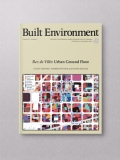
Olympic Cities: City Agendas, Planning, and the World’s Games, 1896–2032
The first edition of Olympic Cities, published in 2007, provided a pioneering overview of the changing relationship between cities and the modern Olympic Games. This substantially revised and much enlarged fourth edition builds on the success of its predecessors. The first of its three parts provides overviews of the urban legacy of the four component Olympic festivals: the Summer Games; Winter Games; Cultural Olympiads; and the Paralympics. The second part comprises systematic surveys of six key aspects of activity involved in staging the Olympics and Paralympics: finance; sustainability; the creation of Olympic Villages; security; urban regeneration; and tourism. The final part consists of ten chronologically arranged portraits of host cities from 1960 to 2032, with complete coverage of the Summer Games of the twenty-first century.
Contents
-
Introduction
John R. Gold and Margaret M. Gold
Part I The Olympic Festivals
-
The Summer Olympics, 1896–2020
John R. Gold and Margaret M. Gold -
The Winter Olympics, 1924–2022
Stephen Essex -
The Cultural Olympiads
Beatriz García -
The Paralympics
John R. Gold and Margaret M. Gold
Part 2 Planning and Management
-
Financing the Games
Holger Preuss -
Olympic Sustainability
John R. Gold and Margaret M. Gold -
Olympic Villages
Tony Sainsbury -
Security
Jon Coaffee and Pete Fussey -
Urban Regeneration
Andrew Smith -
Olympic Tourism
Mike Weed
Part 3 City Portraits
-
Rome 1960
Giuseppe Telesca -
Sydney 2000
Robert Freestone -
Athens 2004
Margaret M. Gold -
Beijing 2008
Ian G. Cook, Stephen Miles and Giorgos Chatzinakos -
London 2012
Graeme Evans and Özlem Edizel -
Rio de Janeiro 2016
Gabriel Silvestre -
Tokyo 2020
Yasushi Aoyama -
Paris 2024
Cécile Doustaly -
Los Angeles 2028
Sven Daniel Wolfe and Cerianne Robertson -
Brisbane 2032
Aysin Dedekorkut-Howes

